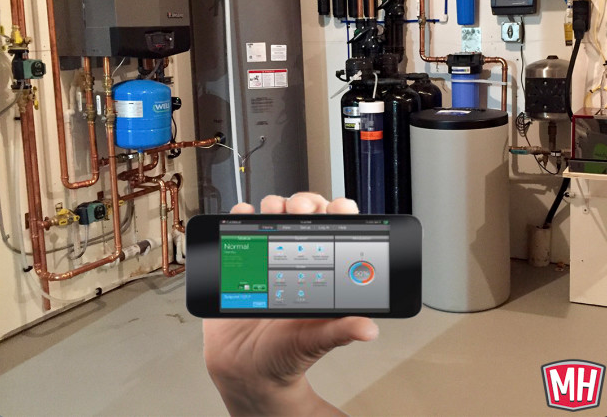“It is not the strongest of the species that survives, nor the most intelligent, but the one most responsive to change.” — Charles Darwin.
Toilets that flush on command through Amazon’s Alexa. Sump pumps that send out instant notifications to your phone the second there is problem. Toilets, sump pumps—do we really need technological advancements for such items that we have been relying on for decades? If it ain’t broke … Is there such a thing as too much technology in our industry?
“There is no such thing as too much technology in the trades. If it helps with productivity, that’s a good thing,” says Jon Block, job superintendent and chief estimator LH Block Electric Co. Inc., Bartlett, Ill.
For example, Block uses his smartphone for ordering materials and pricing out jobs. The supplier has an iPhone app, says Block, which tells me pricing, availability and cut sheets on most parts. It also allows me to place orders until 10pm, to be delivered the next morning. “That sure beats the heck out of calling the supply house, waiting for the counter guy to walk back and check stock, calculate my pricing. I can price out a complete job in my truck in the parking lot of the project. The old saying still holds true, ‘Time is Money!’ I was able to get rid of 200 lbs. of old paper catalogs off my desk.”

Dave Yates, F.W. Behler, Inc., York, Pa., agrees that the more advanced, the better. “One thing is for sure, we’re not going back to standing pilots and thermocouples!” says Yates. “I like the way technology is evolving with WiFi, sending us alerts if something is amiss. If you ask me, we still have a long way to go, but it keeps getting better.”
But not everyone is totally sold. “Everyone wants the technological dreams to come true, but customers don’t really care. More often than not, it’s ‘just fix it,’” says Stuart Klein, master plumber at Langan’s Plumbing & Heating, LLC. “The pricing continues to get out of hand, and the customers fail to see the value in our services,” says Klein.
Yet one of the issues with ever-changing technology is going to be finding parts, says Jeremy Plasse, heating specialist sales, United Plumbing Supply, Springfield, Mass. “You can find a thermocouple for a 40-year-old boiler, but good luck finding some electronic parts from controls 15+ years old. The manufacturer only produces them for a number of years after they discontinue them. Try telling your customer, ‘sorry, cant get that part but here is a quote for 3k for a control upgrade,’” says Plasse.
Others are a bit skeptical still. Planned obsolescence is the term Matthew Kyle, master tech and sales advisor, Pronto Heating & Air Conditioning, Inc., Edina, Minn., uses. “Manufacturers have told me they design systems to meet the warranty life. Controls boards and ECM motors priced out to the customer at $1000+? A lot of new machines are going to be thrown into the scrap dumpster soon,” says Kyle.
Overall, technology has to be a good thing, right? It helps contractors be more efficient. “Technology can be the best solution to the labor shortage,” says Robert O’Brien, owner, Technical Heating Co., Mt. Sinai, New York. For example, says O’Brien, “A boiler with a fault code, the tech can connect to boiler with either Bluetooth or WiFi. At that point a flow chart should appear outlining the fault as well as the troubleshooting procedure to follow. There should be clickable links to video showing how to perform these functions. A less experienced tech can be functional with this type of support.”




Join the conversation: